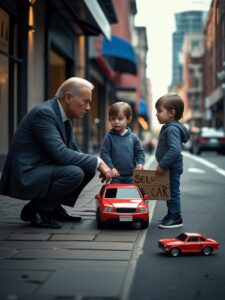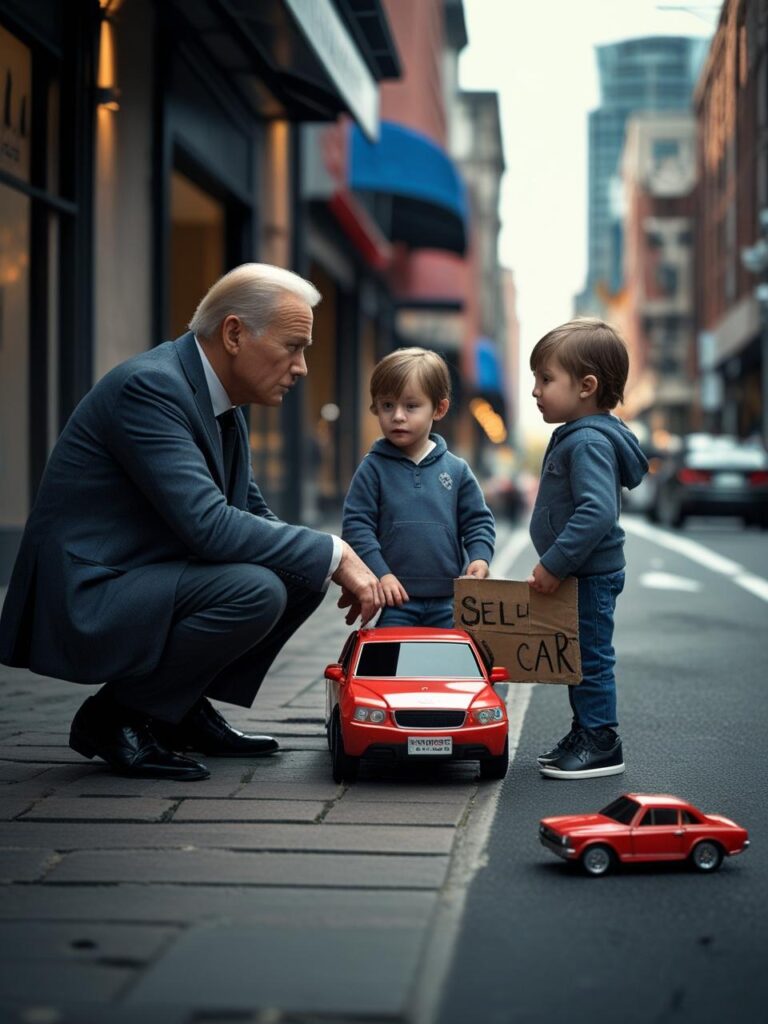The early October chill clung to the city like a second skin. Central Park exhaled a soft wind, rustling through branches and setting loose a shower of orange and copper leaves. They fell in gentle spirals, landing on a weathered bench where two young boys sat — motionless, identical, and heartbreakingly still.
From afar, they looked like a painting trapped in time. Two small figures, framed by gold-tipped trees, sitting too still for children their age. But step closer, and the truth would show itself: tight shoulders, tired eyes, the restless tapping of a tiny red toy car placed between them.
They didn’t speak much. They didn’t need to.
“Someone will want it,” one boy said, his voice barely above the wind.
His brother said nothing, only nodded as he ran a hand along the scratched hood of the toy car. Then, carefully — like he was laying down something sacred — he placed it on the bench again.
Across the path, the world rushed by. Joggers, dog-walkers, office workers clutched coffee cups and phones, moving too quickly to notice the boys or the quiet desperation in their eyes.
Then came the man.
He didn’t belong there — not in his tailored coat, not with his polished shoes clicking against stone. He was used to car services, not park benches. Used to conferences, not conversations with strangers.
And yet, that day, he slowed. That day, he looked.
“Sir?” one boy called softly.
The man turned, brows knitting in mild annoyance — until he saw them. Saw the way they sat shoulder to shoulder, as if leaning on each other just to stay upright. Saw the toy car resting between them like a piece of their hearts.
“Would you… buy our car?” the boy asked.
The man hesitated. “Why?”
They looked at one another. Then one answered, almost in a whisper, “It’s for our mom.”
That was all.
And yet it was everything.
The man walked away. At least, his body did. But something stayed behind — a weight in his chest, the kind that doesn’t loosen with distance. When he glanced back, they were still there. Waiting. Hoping. Small.
He followed them.
They didn’t notice at first. They rose from the bench when no one bought the car. Picked it up gently, as if it were something more than plastic. Walked through the city, hand in hand, toward the edge of the neighborhoods tourists don’t visit.
He watched them disappear into a crumbling building, its windows boarded and stairs rusted.
He stood across the street for a long time.
Then he crossed.

The apartment was worse than he feared. Peeling wallpaper. Flickering lights. A smell of something stale and exhausted. He knocked, unsure of what he was doing.
It was their mother who opened the door.
She was young. Younger than he expected. But her face was lined with the kind of fatigue money can’t cure. Her eyes widened when she saw him — suspicion, confusion, fear all tangled together.
“I… I met your boys,” he said, awkwardly.
Her gaze softened for a split second. “Are they okay?”
“They tried to sell me their toy car.”
Silence.
Then, a sigh.
“I told them not to,” she whispered, more to herself than to him.
They were behind her now, peeking from a dark hallway, the red car clutched between them.
He stepped inside.
What began as a conversation turned into something more. Not charity. Not pity. Something slower. Warmer. He returned the next day. And the next.
He brought groceries. Then books. Then helped fix the leaking faucet. He told himself it was temporary — a kind thing to do. A box to check off in a life full of unchecked ones.
But weeks turned into months.
He learned their names — Leo and Liam. He learned their mother’s story — Claire, once a dance teacher before an accident shattered her spine and their life. He learned what it meant to miss dinner so your children don’t.
And he told them things, too. About his wife who passed. The daughter he lost. The silence he’d chosen since.
The boys listened. Claire listened. The toy car stayed on a shelf by the door.
One night, Liam asked, “Are you rich?”
The man paused. “I used to be.”
Leo frowned. “Aren’t you still?”
He smiled, gently. “I’m starting to be again.”
The apartment changed. Light returned. Laughter, too. He helped Claire find physical therapy. Then part-time work. The boys went back to school. They visited museums. Ate ice cream. Laughed until they fell asleep on the couch.
And the man, who once counted his worth in shares and suits, began measuring it in smiles and second chances.
He never took the toy car.
But one day, the boys gave it to him anyway.
Wrapped in newspaper. Tied with string.
“For you,” they said. “So you don’t forget us.”
He knelt to their level. “I could never forget you.”
Years later, long after the toy had faded to dusty red, the man stood on a stage, accepting an award for building community centers across the city. Reporters asked why he started the foundation.
He smiled.
“It began with two boys,” he said. “And a toy car.”
They laughed. Thought it was a joke.
But in a quiet apartment in Harlem, now renovated and bright, three people knew the truth:
That sometimes, a single act of love — a sacrifice too big for a child — can ripple through the coldest corners of a stranger’s heart.
And change everything.
Because not all miracles shout.
Some whisper.
And some sit silently on a bench, waiting to be seen.
Epilogue
The man passed away in his sleep many years later, peaceful and full of purpose. In his will, he left everything — every penny — to one woman and her two sons.
On his nightstand was a photograph: two boys smiling on a park bench.
And next to it, the little red car.
Still whole. Still loved.
Still a reminder that hope, once given, never fades.
Not really.
Not ever.
Legacy
The community center he built now bears his name. Inside, there’s a glass case by the entrance. Inside it: a faded red toy car, carefully preserved, and a plaque beneath that reads:
“To those who choose kindness when no one is watching. This car once saved a life. May it remind us all: we’re never too small to change someone’s world.”
And every year, on a quiet morning in October, a woman with streaks of silver in her hair and two grown sons visit the bench where it all began. They sit in silence, just for a moment, letting the leaves fall. Remembering the man who saw them.
And the world that changed because he did.


